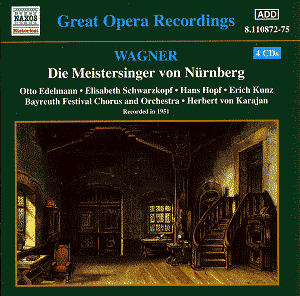The 1951 performances of 'Die Meistersinger' had great
significance at Bayreuth. The first performances of the opera there
since the War, Wieland Wagner's production was designed to purge
the work of its Nazi associations. With the publication of the recent
biography of his mother, Winifred, we are coming to understand that
her enthusiasm for the Nazis was not as total as it first appeared
and that Wieland's own Nazi associations may have been rather greater
than we have been led to believe. But whatever its political associations,
these performances were tremendous with a fine cast led by the Viennese
bass-baritone Otto Edelmann as Sachs. Nowadays we do not always
associate Schwarzkopf with Wagner, but she made her debut at the
Berlin State Opera in 1938 as a Flower Maiden in Parsifal. Besides
Eva, Elisabeth and Elsa were also in her repertoire. Hans Hopf,
the Walter, started out as a lyric tenor but in the early 1940s
he re-trained as a helden-tenor and appeared frequently at Bayreuth.
As Beckmesser, Erich Kunz is an artist now more associated with
Mozart and with operetta. Gerhard Unger, who plays David, was the
leading German character tenor of his generation.
Regarding speeds, both Karajan recordings are
remarkably consistent in their running time (this one 268 minutes,
his later Dresden one 266 minutes). In fact, there is a remarkably
consistency amongst conductors regarding the running time of the
opera. The longest I came across was Knappertsbusch (at 295 minutes),
but he also turned in a recording lasting 266 minutes. The shortest
running time being Solti's Chicago performance (259 minutes).
Of course, this takes no account of the recordings I have missed
and the fact that some of these performances may have been cut.
The performance opens with an overture that is
lively and theatrical. Aurally, it sounds as if we are almost
in the midst of the orchestra. I found the sound quality of this
recording one of its most unsatisfactory points. It is not bad,
but sounds rather flat and lacks atmosphere.
Despite its liveliness, the overture is very
sober and serious. It rather lacks smile. When all is said and
done, this is a comedy albeit a rather long and serious one. Even
the opening scenes with David have a thoroughgoing seriousness
about them.
But Kunz's David rightly dominates the second
scene of Act 1. With his bright, forward tone he is a fine, lively
David with just an occasional hint of steeliness in the upper
register.
Frederick Dalberg's noble, upstanding Pogner
is at his best in the lovely St. Johannestag speech in Act 1.
His tone, though, does yield under pressure and displays too much
vibrato for my comfort. This is a real ensemble production, so
that the Mastersingers scene shows a fine interplay between equals.
Karajan makes a good accompanist here and the orchestra rarely
tries to dominate.
Edelmann's Sachs is at first rather dry toned,
though his tones are warmer in Act 2 but still lack poetry. His
approach is too emphatic and lacks a feeling for legato and a
sense of line. These problems notwithstanding, he gives a powerful
account of the "Wahn" monologue, but I could not help feeling
that it could have been far finer.
As Walter, Hans Hopf is a bit of a dull stick,
though one with a fabulous voice, but he does come alive during
his Act 2 outburst. And both he and Sachs are heard at their best
in Scene 3 of Act 2, the forging of the prize song. Hopf's tone
here is sheerly beautiful (or as beautiful as a true helden-tenor
can ever be) and Edelmann finds a vein of lyrical beauty that
is lacking in much of the rest of the work
Schwarzkopf is covered by the orchestra at climactic
moments, the role stretches her to her limits but her Eva is always
beautiful, she never makes an ugly sound. Her usual care over
words and phrases creates a rather mature, knowing Eva, but then
virginal radiance is not really a quality we associated with Schwarzkopf's
operatic portrayals.
Kunz's Beckmesser is a traditional characterful
portrayal. He does find sufficient vocal resources to make his
serenades credible and in the important Scene 5 of Act 2 his fine
singing takes the edge off the caricature, rounding out the portrait
of Beckmesser.
The final scene in Act 3, has the same rather
sober, serious atmosphere of the overture and the apprentices
scene is desperately unamusing. But the recording comes into its
own once the serious singing starts. The aural picture, here,
is rather confused in the big ensembles.
But this is true of the whole recording, where
the big ensembles are too much. The voices are caught rather closely,
which does not help the aural atmosphere, and it renders them
rather harshly at times. In his notes on the recording the transfer
engineer comments that this recording does not capture the special
acoustic of the Festspielhaus. (That this was possible is shown
by the Decca's recording of the Knappertsbusch 'Parsifal' which
was made at about the same time).
Undoubtedly, Karajan enthusiasts will want to
have his later Dresden recording of this opera. It received a
huge review from Andrew Porter in the Gramophone when it first
appeared and it is certainly a very great recording. But this
recording is greater than the sum of its parts and it is of interest,
not only for its fine cast but as a tangible record of a very
historic occasion.
Robert Hugill
see also review
by John Portwood

